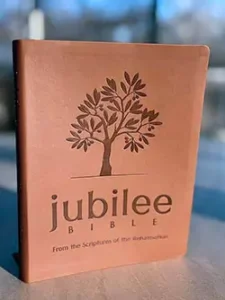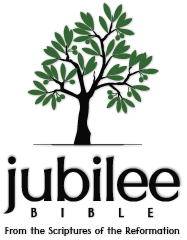The Jubilee Bible
From the Scriptures of the Reformation
Editor’s Notes
Of the original edition of Casiodoro de Reina, we only know of a handful of copies that survived the fire of the Spanish Inquisition. Many Bibles were burned together with their owners. William Tyndale was killed because he translated, published, and distributed the Word of God. But when the devil knew that he could not stop subsequent editions of the Holy Scriptures, he was obligated to change his tactics. Taking advantage of the good intentions of many to actualize, modernize, and simplify the Bible, the Enemy was able to plant his tares, partially dim the light and truth of the Word of God, and little by little, dull the sword of the Christian.
It is our intention to actualize orthography and grammar only to the extent that we are confident that the original full range of meaning can be preserved; that we may deliver to you a translation that contains all the force and anointing that was poured out in the sixteenth century over men like Francisco de Encinas, Juan Pérez de Pineda, Casiodoro de Reina, Cipriano de Valera, and William Tyndale — men who were chosen by God to be translators of the Bible.
Keeping to the tradition of these reformers, we have continued to take great care to ensure that key terminology is translated in a uniform manner and to footnote exceptions. These features also make this an outstanding Bible to study by computer. The first usage, last usage, and development of each key term has been carefully checked (the number of overall instances and number of verses in which a given term is used have been carefully tabulated and tracked to ensure separation of terminology and to eliminate the use of synonyms wherever possible within the limits of the English language). This means that when you print a list of all the occurrences of a given term or phrase and study these verse lists, this Bible then defines itself, and the exact value that God has placed on each key term can be established beyond the shadow of a doubt without the need to look up the meanings of the words in a dictionary or commentary that may have been tainted by human endeavor (which in some cases could also be slanted according to the doctrine or school of thought of those who compiled the material).
We have also made an effort to preserve the emphasis of the original translators in our use of capitals and words in italics. Italics are used when the translator considered the word to be necessary in order to complete a proper translation of the thought or phrase, but the word does not appear in the manuscript of the original language. Words enclosed in curly brackets are explanations amplified by the translator to avoid misunderstandings. The punctuation and orthography have the principal purpose of preserving the meaning, flow, and unity of the original manuscripts and do not always follow the norm of modern English.
The Name of God appears in the Hebrew manuscripts of the Holy Scriptures with four consonants (without vowels) YHWH or JHVH and translates literally into English as I AM (according to Exodus 3:14). This is expressed in like manner in Greek in various New Testament texts (see Matthew 14:27; Mark 14:62; Luke 22:70; John 4:26; 6:35, 41; 8:18, 24, 28, 58; 11:25; 18:5-8; Revelation 1:8, 11, 17; 2:23; 21:6; 22:13, 16). The ancients considered that the Name of God was too sacred to pronounce, and so they read Adonai or Lord each time that they encountered the four consonants of the tetragrammaton. This tradition was followed by our Lord Jesus and by the apostles in more than three hundred instances when they were quoting the Scriptures of the Old Testament. In this work, for the most part, we have continued in the tradition of our Lord Jesus in regard to the Name of God (YHWH) in the Old Testament. If the original read YHWH, the translation reads LORD. If the original read Adonai, the translation reads Lord. If the original read Adonai YHWH, the translation reads Lord GOD. In a few instances (such as Exodus 3:14), the tetragrammaton is translated I AM.
Translator’s Notes
Amen – So be it.
Belial – Satan; the evil one.
Charity – The original translators used this term to differentiate God’s love (Gr. ágape) from man’s love (Gr. phileos). God’s love is born of sacrifice (not of human emotion) and is redemptive by nature. God the Father gave his only Son; Jesus gave his life for us. Only God can put this type of love within us; we are not capable of this on our own (see 1 Corinthians Chapter 13).
Chasten – Primary meaning: to refine or to purify; comes from the root: chaste.
Congregation – In the Old Testament, this includes all of Israel. In the New Testament, this word is used in italics to translate the Gr. ekklesia, which literally means called out ones. This applies to and includes individuals, small or large groups, and even the universal body of Christ.
Earth = Land – The same word in the original language; spiritually, this has to do with the people of God.
Eternal – Primary meaning: denotes a change in quality (like a change of state). Secondary meaning: unlimited time as a consequence of coming into another realm (God’s realm). Therefore, eternal life is not life in the human quality that we inherited from Adam, going on forever; rather, it is a new quality of life in Jesus Christ, which may begin now for those who are born again by the Spirit of God.
Fools – Those who are governed by carnal thoughts or desires. This is folly in God’s eyes.
Halelu – Praise ye.
Jubilee – Primary meaning: freedom or liberty. Secondary meaning: the joy of being set free.
Life = Soul – The same word in the original language, translated one or the other, according to context.
Right Hand – Authority (power or strength).
Selah – Stop and think about it, or meditate on this.
Shadow – Includes the connotation of covering and protection.
Sheol (Heb.) or Hades (Gr.) – The empire of death under the power of Satan that imprisoned even the just until the redemptive work of Jesus, and which, even now, retains the unjust as they await final judgment. This is different from the lake of fire or gehena (hell) of the final judgment which is the second death. (see Luke 16:20-31; Ephesians 4:8; Revelation 20:14).
Shofar – Special ram’s horn trumpet blown on the day of atonement to announce the year of Jubilee, and on other special occasions.
Spirit = Wind = Breath – The same word in the original language, translated according to context.
Unicorn – Meaning one horn. In the old Spanish this is the rhinoceros.
Use of Italics: Words added by the translator either for proper English or for clarification.
Use of Pronouns:
Thee, Thou, Thy – Always singular – Note: serious doctrinal error can result from the consequences of changing thee, thou, or thy to you or your. This can cause scriptural promises or directives addressed to the individual to be mistakenly applied to a corporate group. Modern English is ambiguous in this regard and lacks the precision necessary to accurately render the true meaning of the original language.
Ye – Always plural – always denotes a corporate or plural situation. Note: serious doctrinal error can result from the consequences of changing ye to you and then indiscriminately applying scriptural promises or directives that apply corporately to the People of God to a given individual. Modern English has lost this important distinction.

Copyright © 2020
by Russell M. Stendal
All rights reserved.

ISBN: 978-1-64765-022-3
eBook ISBN: 978-1-64765-087-2
